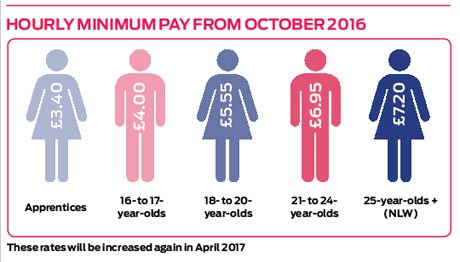National Minimum Wage - Name and shame
Ruth Stokes
Monday, September 5, 2016
Nine nurseries have been ‘named and shamed’ on the latest minimum wage offenders list. How did they get there, and how easy was it to fall foul of the rules? Ruth Stokes reports

Each year, the Government publishes a list of all those business which haven't complied with the minimum wage. This August's was the largest ever – with nearly 200 offenders, nine of which are nurseries.
A number were members of the National Day Nurseries Association, which says that while nurseries have a responsibility to ensure they understand the law, a number are ending up on the list inadvertently because of confusion over the intricacies of payment rules. Some owners have branded the list 'draconian'.
Little Beehive Nursery in Fife appears on the Government's list of offenders because it owed £9,065.14 to seven workers, but director Jennifer Martin says that the underpayment was an unintentional error relating to apprenticeships.
‘All our qualified staff are paid above the national minimum wage (NMW), and apprentices are actually paid above the apprentice rate,’ she says. ‘The error was that when some apprentices finished a 12-month contract and we extended their contracts for a few months to let them finish the apprenticeship, it wasn't picked up by our payroll department that they were over 19 years of age and that they had to go on to at least NMW for their age.’
She says the nursery called Acas for advice on extending the contracts, but was not reminded about the wage change. The law dictates that if an apprentice has been working for a business for more than 12 months and is over the age of 19, they must be paid at the NMW set for their age group (see box, below).
Ms Martin adds, ‘We have no problem fixing an error, and it was a genuine error, but what they're doing is humiliating small businesses who work incredibly hard and have made a mistake.’
Small Talk Nurseries in Birmingham appears on the list for owing £1,499.30 to 10 workers. Managing director Ranjit Singh says that the underpayment here was also related to apprenticeships, and training. ‘We had two apprentices who were going one day a week for four hours to college and I was not told by anyone to pay them for those four hours, and I believed that was their time,’ he explains.
‘The training was another thing, as on one occasion eight members of qualified staff had paediatric first-aid training. This was on a Saturday, and again no-one had told me that I had to pay the staff for that time on training.’
Mr Singh adds that he paid the wages owed as soon as his mistake was highlighted by an HMRC inspection.
The NDNA has produced a factsheet on the issues which also include benefits in kind, what counts as working hours, the pay reference period and types of work (see box, right).
Purnima Tanuku, chief executive, says, ‘Wilful failure to pay is wholly unacceptable. [But] our members struggle to navigate the complicated sea of rules and tell us that there is a lack of clear information to guide them. It's vital nurseries ensure they understand and follow NMW requirements. Equally, as Government is now taking these new punitive measures, it has a greater responsibility than ever to provide clear guidance.’
One common pitfall, says Ms Tanuku, is when employers deduct costs for a service or item from an employee's pay. ‘Some nurseries fall foul of this if a member of staff has children at their nursery and they deduct childcare costs from their wages before paying them,’ she explains.
Deductions were the cause of underpayment at Bambinos nursery in Plymouth, according to its owner William Lane, who told the Plymouth Herald there was ‘a technical breach regarding deductions from gross pay and all employees have subsequently been repaid additional monies owing to them’. Bambinos owed £2,381.97 to 58 workers.
Imogen Edmunds, who runs early years HR consultancy Redwing Solutions, adds that a nursery could get caught out by something as simple as deducting money from wages for a lost locker key, which might take that employee below the NMW by accident. When it comes to apprenticeships, mistakes happen because employers don't just need to be aware of an apprentice's age and date of birth, but also whether they are working overtime, she says.
‘An employer might contract an apprentice to work for 35 hours a week at £3.30, but then they might happen to do two hours overtime,’ she explains. ‘But the employer isn't allowed to pay them the £3.30 rate then: if they're doing overtime, they have to pay them the NMW rate for their age – not the apprentice rate.’ More generally, the introduction of the National Living Wage in Aprilmay have caught some out: ‘Nursery owners have to keep their eye on the rules in a lot of areas. And those rules change all the time.’ She adds that expecting employees to come in for training for free, when they should be paid NMW, is a common problem.
Ms Martin adds. ‘How many businesses have they affected by this draconian method of trying to fix the problem? I can see what they're doing, but they're not getting to the people they should be getting to – they're getting to the people who make a genuine mistake.’
As further evidence of what she sees as a flawed approach, Ms Martin points to the owner of Whiz Kids Day Nursery in Peterborough, who tried to set the record straight after appearing on the February name and shame list even though the underpayment was inherited from previous ownership using the Bright Kids brand. Owner Liz Debenham said, ‘I explained the situation to the inspector – that I had only just taken over the business and it was only three weeks of employment I had paid the employee the wrong rate [before correcting it], all the time previous to that I did not even own the business so how on earth could I be held responsible.’
The nursery remained on the list after Ms Debenham's complaint, but she was able to calm parents’ concerns. ‘As it was broadcast on the news and radio, several parents were concerned and asked about it. I sent out a blanket email to all parents including new parents who had not started with us yet but were registered, explaining the whole situation and they were all fine about it. Several replied with thanks for explaining and some with offers of help.’ She believes there is enough clear guidance available on the NMW.
The Government says the list is one of the ways it cracks down on those who ignore minimum wage law, and failing to pay at least the minimum wage to workers is not acceptable.
To avoid ending up on the list in the future, Ms Edmunds advises being conscious of the potential pitfalls using GOV.UK and Acas.org.uk. ‘It's a good idea to be mindful if you're paying on or near the NMW that you can't just go deducting stuff from people's wages,’ she says.
It also helps to be aware of when changes may be made. ‘1 April and 1 October are common dates on which laws are amended and revised,’ Ms Edmunds says. ‘Those are the two points in the year where employers should be wondering if anything has changed.’
More information
NMW offenderslist, http://bit.ly/2aLTt5v
Acas, www.acas.org.uk/index.aspx?articleid=1902
GOV.UK, https://www.gov.uk/national-minimum-wage/what-is-the-minimum-wage

COMMON PITFALLS
Benefits in kind Apart from a small statutory allowance for accommodation, benefits in kind cannot be used to offset pay below the NMW. You cannot, for example, give employees free lunches worth £10 a week and then pay them £10 a week below the NMW. Free or subsidised goods and services cannot be used to bolster pay.
Working hours What counts as working hours in a nursery may not be simple to determine. As an example, if you require employees to arrive at work in their ordinary clothing and change into uniform once at work, do they arrive at work at 8.30am and then change, or do you require them to arrive at the nursery early to change, so that they are ready to work by 8.30am? If you require them to arrive by 8.20am then they are under your control from 8.20am, and that is when their working hours begin.
Pay reference period An employee's pay reference period can play a large part in determining whether an employee has been paid the NMW or not, because the NMW only has to be paid on average over the pay reference period. The longer the pay reference period, therefore, the more time there is for any “overs” and “unders” to even themselves out.
For more detailed guidance and examples, see the full NDNA factsheet at http://bit.ly/2bUmqkr









